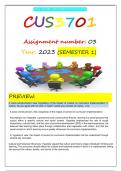LOLA JACOBS ASSIGNMENTS 0618151315
CUS3701
Assignment number: 03
Year: 2023 (SEMESTER 1)
PREVIEW:
A socio-constructivist’s view (Vygotsky) of the impact of context on curriculum implementation (7
marks). Do you agree with his view (1 mark)? Justify your answer (2 marks). (10)
A socio-constructivist's view (Vygotsky) of the impact of context on curriculum implementation:
According to Lev Vygotsky, a prominent socio-constructivist theorist, learning is a social process that
occurs within a specific cultural and social context. Vygotsky emphasized the role of social
interactions, cultural tools, and the zone of proximal development (ZPD) in the learning process. He
believed that learning takes place through collaboration and negotiation with others, and that the
social context in which learning occurs greatly influences the curriculum implementation.
In Vygotsky's view, the impact of context on curriculum implementation can be understood through
several key concepts:
Cultural and historical influences: Vygotsky argued that culture and history shape individuals' thinking and
learning. The curriculum should reflect the cultural and historical context in which it is implemented, taking
into account the values, beliefs, and norms of the community
, LOLA JACOBS ASSIGNMENTS 0618151315
9.8.3 Assignment 03
This assignment is compulsory and will contribute 40% towards your year mark. NO
EXTENSION will be granted! DO NOT copy the textbook! You MUST write in your own
words.
Submit your assignment online.
ASSIGNMENT 03
QUESTION 1
The way we interpret the world around us is determined partly by our beliefs, values and
norms, but mostly by contextual influences. The educator’s interpretation and
implementation of a curriculum is also influenced by the context. Choices regarding planning
and designing a learning programme, the inclusion of particular instructional strategies and
the practical application are embedded in knowledge and the understanding of the
educational situation. Influences ranging from the political, social and economic culture to
the norms and knowledge structures of educators affect teaching and learning.
Taking the above into consideration, critically discuss the following:
1.1 A socio-constructivist’s view (Vygotsky) of the impact of context on curriculum
implementation (7 marks). Do you agree with his view (1 mark)? Justify your answer (2
marks). (10)
A socio-constructivist's view (Vygotsky) of the impact of context on curriculum
implementation:
According to Lev Vygotsky, a prominent socio-constructivist theorist, learning is a social
process that occurs within a specific cultural and social context. Vygotsky emphasized the
role of social interactions, cultural tools, and the zone of proximal development (ZPD) in the
learning process. He believed that learning takes place through collaboration and negotiation
with others, and that the social context in which learning occurs greatly influences the
curriculum implementation.
In Vygotsky's view, the impact of context on curriculum implementation can be understood
through several key concepts:
Cultural and historical influences: Vygotsky argued that culture and history shape individuals'
thinking and learning. The curriculum should reflect the cultural and historical context in
which it is implemented, taking into account the values, beliefs, and norms of the community.
Zone of proximal development (ZPD): The ZPD refers to the gap between a learner's actual
developmental level and their potential developmental level with the assistance of others.
Vygotsky believed that the curriculum should be designed to scaffold students' learning
within their ZPD, providing appropriate challenges and support to promote their cognitive
development.
2
, LOLA JACOBS ASSIGNMENTS 0618151315
Social interactions and collaboration: Vygotsky emphasized the importance of social
interactions in learning. He argued that curriculum implementation should create
opportunities for students to engage in collaborative activities, such as group work or peer
discussions, to enhance their understanding and construction of knowledge.
Cultural tools and mediators: Vygotsky introduced the concept of cultural tools, which are
symbolic systems or artifacts (e.g., language, writing, technology) that mediate individuals'
thinking and learning. The curriculum should incorporate relevant cultural tools to support
students' cognitive development and facilitate their understanding of subject matter.
In summary, Vygotsky's socio-constructivist view highlights the significant impact of context
on curriculum implementation. He emphasizes the role of social interactions, cultural tools,
and the ZPD in shaping learning experiences. Vygotsky's perspective underscores the
importance of considering cultural and historical influences, promoting collaboration, and
providing appropriate scaffolding within the curriculum.
Do I agree with his view?
Yes, I agree with Vygotsky's view on the impact of context on curriculum implementation.
Context plays a vital role in shaping educational practices, and a socio-constructivist
perspective acknowledges the influence of social, cultural, and historical factors. By
considering the context, educators can design curricula that are relevant and meaningful to
the learners, taking into account their cultural backgrounds, prior knowledge, and social
interactions. Vygotsky's emphasis on collaborative learning, the ZPD, and cultural tools
aligns with research and contemporary educational practices that recognize the importance
of sociocultural factors in effective curriculum implementation.
In conclusion, Vygotsky's socio-constructivist view provides valuable insights into the impact
of context on curriculum implementation. While it is essential to consider other perspectives
and theories in education, his emphasis on social interactions, cultural tools, and the ZPD
contributes to a comprehensive understanding of how context shapes teaching and learning
experiences.
1.2 The influence of changes in the South African context on curriculum by referring briefly
to the most important economic, social and political forces. (20)
In the South African context, various economic, social, and political forces have a significant
influence on curriculum development and implementation. Here is a brief overview of the
most important forces in each of these areas:
Economic Forces:
a) Globalization: South Africa, like many other countries, is affected by the forces of
globalization. The interconnectedness of economies and the need to compete in a global
market impact the curriculum by emphasizing the development of skills and knowledge
3




